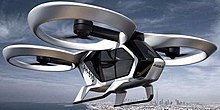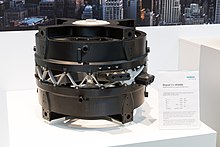Airbus CityAirbus
| CityAirbus | |
|---|---|

| |
| Updated configuration in September 2021: main wing with six ductless rotors, twin boom tail with two control rotors | |
| Role | Electric aircraft project |
| National origin | Multinational |
| Manufacturer | Airbus Helicopters |
| First flight | May 3, 2019[1] |
| Status | Under development |
The Airbus CityAirbus is a multinational project by Airbus Helicopters to produce an electrically powered VTOL personal air vehicle demonstrator. It is intended for the air taxi role, to avoid ground traffic congestion.[2]
Development



The CityAirbus follows other Airbus Urban Air Mobility initiatives: Skyways to deliver packages by UAVs on the National University of Singapore campus, the A³ Vahana single-passenger, self-piloted VTOL aircraft and the A³ Voom on-demand shared helicopter booking service app by Airbus.[2]
A 2015 feasibility study confirmed the design's operating costs and that it could meet safety requirements. Full-scale testing of the ducted propeller drivetrain was completed in October 2017. Type certification and commercial introduction are planned for 2023.[3]
The iron bird systems test prototype was completed and powered on in December 2017 on a test bench in Taufkirchen, Germany, to test the propulsion system chain, flight controls and propeller dynamic loads, verifying the electric, mechanical and thermal dynamics before being installed on the flight demonstrator by mid-2018.[4]
The first structural parts for the demonstrator were produced by Airbus Helicopters. The aircraft's first unmanned flight was on 3 May 2019.[1] Manned flights have been planned for 2019.[5] 31 August 2020 the CityAirbus demonstrator moved from Donauwörth to Manching near Ingolstadt in Bavaria.[6]
After 242 flights over 1,000 km (540 nmi) in total with the Vahana and CityAirbus demonstrators, Airbus updated the CityAirbus project in September 2021.[7] The new configuration boasts a fixed wing, a V-tail, and eight electric propellers without moving surfaces or tilting parts.[7] It should carry up to four passengers over 80 km (43 nmi) at 120 km/h (65 kn) with sound levels below 65 dB(A) during fly-over and below 70 dB(A) during landing.[7] First flight is planned for 2023 and certification is expected around 2025.[7]
EASA is already working on a special condition VTOL (SC VTOL) means of compliance (MOC) to certify eVTOL aircraft. The final version of the MOC for eVTOLs will use newly developed Eurocae standards. The second flight control computer will be developed in collaboration with Diehl Aviation and Thales.[8]
Design
The multirotor is intended to carry four passengers, with a pilot initially and to become self-piloted when regulations allow. The overall system is being developed in Donauwörth, with the electrical propulsion system built in Ottobrunn/Munich. The use of four ducted fans contribute to safety and low acoustic footprint. The fully integrated drivetrain has eight propellers and eight 100 kW (130 hp) Siemens SP200D direct-drive electric motors. The fixed pitch propellers are controlled by their RPM. The four electric batteries total 110 kWh (400 MJ) and can produce a combined output four times 140 kW (190 hp). The design should cruise at 120 km/h (65 kn) on fixed routes with 15 minutes endurance.[3]
Specifications

Data from Electric VTOL News[9]
General characteristics
- Crew: 1 optional
- Capacity: 4 passengers 250 kg (550 lb) payload
- Length: 8 m (26 ft 3 in)
- Wingspan: 8 m (26 ft 3 in)
- Max takeoff weight: 2,200[10] kg (4,850 lb)
- Powerplant: 8 × vertical electric ducted fan, 100 kW (130 hp) each specially designed Siemens SP200D direct-drive, 4 × 140 kW (190 hp) battery output
- Propellers: 2.8 m (9 ft 2 in) diameter pitch rotor
Performance
- Cruise speed: 120 km/h (75 mph, 65 kn)
- Endurance: 15 minutes
See also
Related development
References
- ^ a b Dan Parsons (3 May 2019). "City Airbus eVTOL Prototype Makes First Flight in Germany". Rotor & Wing. Archived from the original on 6 May 2019. Retrieved 6 May 2019.
- ^ a b "CityAirbus Backgrounder" (PDF). Airbus. June 2017. Archived from the original (PDF) on 22 December 2017. Retrieved 21 December 2017.
- ^ a b "CityAirbus demonstrator passes major propulsion testing milestone" (Press release). Airbus. 3 October 2017.
- ^ "Helicopters Iron Bird Power On: CityAirbus reaches next milestone" (Press release). Airbus. 19 December 2017.
- ^ Dominic Perry (20 December 2017). "Airbus Helicopters powers up CityAirbus 'iron bird' rig". Flightglobal.
- ^ "CityAirbus Moved to Manching". helis. 31 August 2020. Retrieved 13 September 2020.
- ^ a b c d "Airbus reveals the next generation of CityAirbus" (Press release). Airbus. 21 September 2021.
- ^ Bellamy III, Woodrow (17 November 2021). "Diehl and Thales to Develop Flight Control Computers for CityAirbus NextGen eVTOL". aviationtoday.com. Retrieved 18 November 2021.
- ^ "Airbus CityAirbus". evtol.news. Retrieved 1 August 2020.
- ^ Guy Norris (13 May 2019). "The Week In Technology, May 13-18, 2019". Aviation Week & Space Technology.
External links
- Airbus Helicopters
- "Future of urban mobility" (Press release). Airbus. 6 December 2016.
- Graham Warwick (15 March 2017). "Airbus Intensifies Work On Urban VTOL Air Transport". Aviation Week & Space Technology.
- Tony Osborne and Graham Warwick (23 February 2018). "On-Demand Helicopter Experience Feeds Into Airbus Air Taxi Design". Aviation Week & Space Technology.
